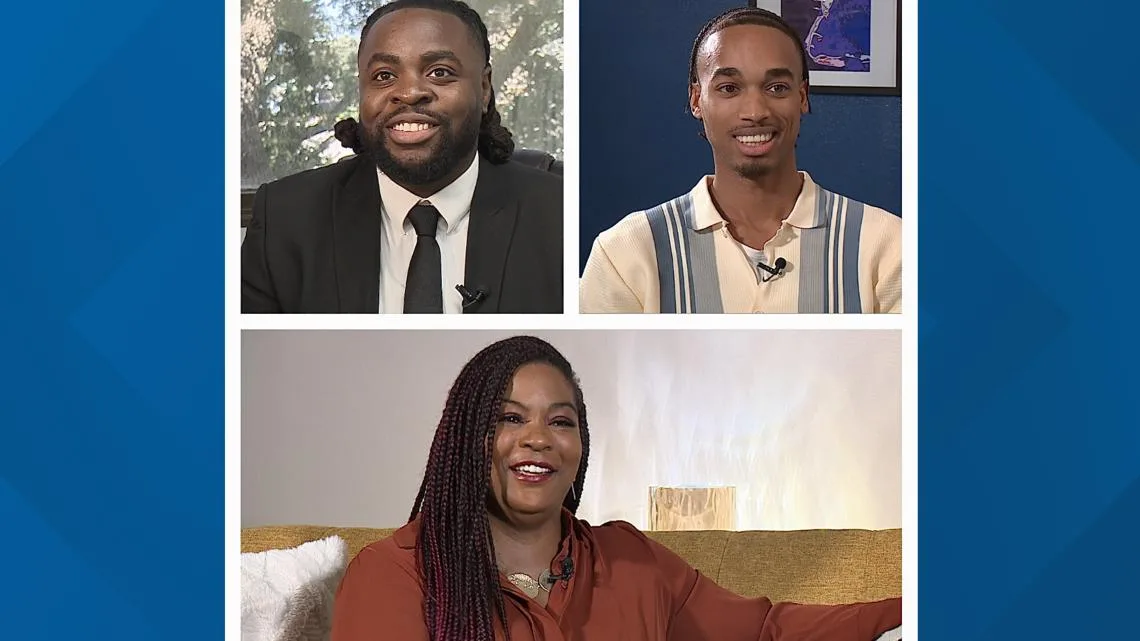
The desire to help others is the common denominator for these three local mental health experts who say there’s been a lot of progress, and there’s room for more.
CORPUS CHRISTI, Texas — As we continue our Black History Month coverage at 3NEWS, we visit a topic that for many, is not so easily discussed: mental health.
It can be especially difficult if the resources to have those conversations are lacking in representation.
In this “On Your Mind,” 3News anchor, Leslie Adami, introduces us to the professionals right here in our community who are working to change the stigma and increase representation in the Coastal Bend and within the Black community.
The importance of representation
In downtown Corpus Christi, you’ll find Crystal Kitchen’s practice “Healing in Motion Counseling Services” off of Mann Street.
The Corpus Christi native said she was always raised to be a helper, and over the last five years, she’s gotten to do just that through her profession as a licensed professional counselor and therapist.
Over those last five years, she’s seen a lot and heard a lot, including how she’s found by many of her clients.
“My experience is that, usually when people are looking for a therapist, particularly a Black therapist, they’ll google ‘Black therapist,'” Kitchen said. My name pops up for this area and they love to reach out and connect.”
“They’ll say, ‘I’m so glad I found a Black therapist right in Corpus Christi,’ and they’re excited about it,” she said.
Kitchen said connection is instant, especially when it comes to having to be vulnerable.
“There’s been a lot of generational trauma, so people who come to speak with me, there may be some things they’re touching on that has something to do with generational trauma, so it helps when I’m able to bring a sense of connection with their culture,” said Kitchen.
She understands a big hurdle for anyone seeking mental health support may also be the financial aspect of it, which is why she offers one session pro-bono, and also takes insurance.
Kitchen said, she hopes that can help more people feel encouraged to begin their mental health journey, but realizes that the lack of representation coupled with harmful stereotypes, can hinder that journey.
“There’s a lot of stereotypes about therapy and Black people being in therapy, let’s change that,” she said. “Let’s change that narrative and we have the ability to do that.”
Shaking stigmas & breaking barriers
The desire to see more representation is something that resonates with Lawrence Oke, a psychiatric mental health nurse practitioner at South Texas Mental Health Associates.
“I do believe the number is sparse and always encourage other Black professionals that I know and see to dive into mental heath,” he said.
Oke’s been working in mental health for five years now, sharing he felt inspired to go into the field because he knew there was another way to help people beyond their physical health. However, he agrees too that it can be difficult, when there are still stigmas attached to the line of work.
“As a Black man growing up, we’re taught to be strong and not really show that much emotion,” Oke said. “We’re taught that crying is a sign of weakness, and as far as being a Black man part of a family, you always want to be the strength for your family. So, that’s pretty much why I got into this role: to show people that I’m a Black man, and I’m here to kinda show people, hey someone who looks exactly like you can help you with what’s going on.”
He also discussed how various stressors of today and everyday life can take a toll on one’s mental well-being, whether it be financial, family, social media, work or something else—it’s important to not keep it bottled up.
Oke’s goal is to create a safe space for adults today, and for the generations to come: finding hope in his little girl.
“Hopefully, she can put herself in a position to make some type of change as well,” he said.
Moving the conversation forward
Among the change-makers looking to move the conversation forward is Ke’tavion Humber, a counselor-in-training within the Educational and Psychology department for Professional Counseling Master’s Program at Texas A&M University-Corpus Christi.
At a young age, Humber said he realized he was destined to help others.
“I found joy in talking to people, and then ironically enough, people found it comforting to come to me with their problems,” said the grad student, who shared he knew he wanted to work in mental health since he was in middle school.
Flashforward to today, Humber is already changing lives through an internship at a local practice at My Healing Center of South Texas (formerly known as Youvolve) where he is seeing clients, with a focus on family and marriage counseling.
“The most interesting thing is finding out who is this person in front of me, ‘what’s their story?’ Not necessarily what their problem is, but who is this person? And how can I help them,” he said.
Humber too has seen how certain stigmas and stereotypes can harm and hinder people from seeking that extra resource, but that more are choosing to let their walls come down.
“There’s a lot of stigmas, just about the idea of counseling and on the good side, there’s a lot of awareness within the African American community,” said Humber.
“Awareness of mental health is rising for African American men, and I think with that, more men are becoming more comfortable about talking about what’s going on in their mind or what’s going on within themselves and finding more friends and family members who actually understand what they’re talking about.”
The relationship between mental health & sports
In reflecting upon his own track career with the Islanders, Humber said what he was learning and what he was studying, actually went hand-in-hand.
“A lot of athletes, we use that to channel stress and things that cause trouble in our lives and, I think it’s an issue when a lot of athletes end their career and they’re met with all these problems they had a healthy way to let go,” explained Humber, who hopes that young athletes in the Coastal Bend will choose to nurture their mental health as they do their physical health.
“Becoming aware of that after the fact, I could only imagine how it could have changed my career as an athlete and how it could change other athletes’ careers just by being aware of your body,” he said
For Humber, the dream future career would be to own his own practice, one that involves counseling as well as an athletic department and wellness center to help remove the taboo of going to a building for counseling.
Normalizing mental health conversations
Though each on their different paths in the profession, the desire to help others is the common denominator for these three local mental health experts. They each say there’s been a lot of progress, and there’s room for more when it comes to representation, educating other generations and normalizing mental health conversations.
“I want them to know they’re not alone, and some things they struggle with they may feel like they’re not alone, and the best part about it is to speak up,” said Oke. “We always hear a quote that ‘silence is golden,’ and when it comes to mental health, I don’t believe that silence is golden.”
“Let’s talk about it all the time. We want to be in the conversation,” said Kitchen.
RELATED STORIES:


